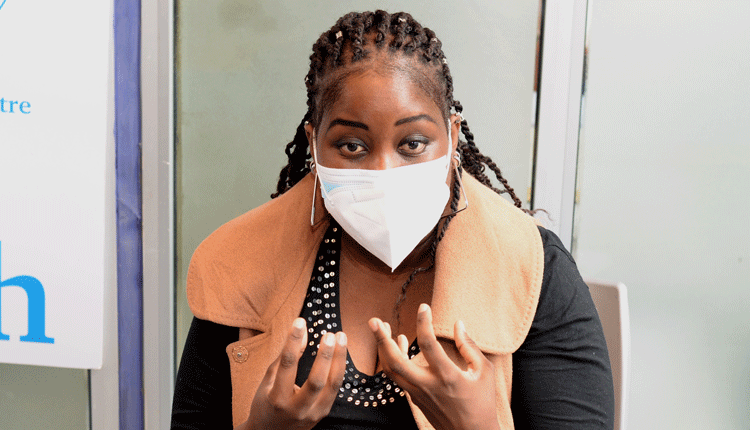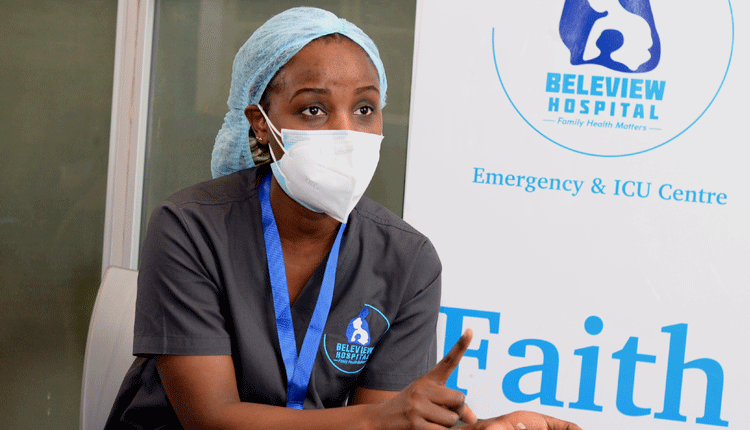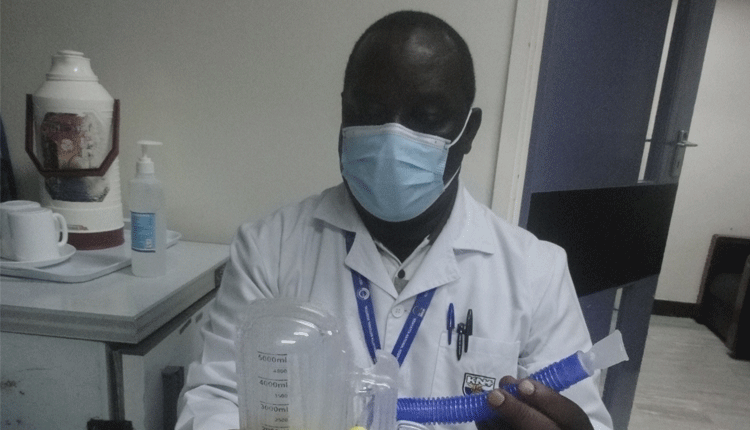Physiotherapists play critical role in pandemic

Mercy Wairimu was in deep thought inside the ambulance in which her daughter, Joy Wambui, 25, laid motionless.
She came back to her senses as the ambulance from Belleview Hospital in South C in the city arrived at their Ruiru residence.
Her attention was caught by the flurry of fleeing neighbours who scampered for safety at the sight of the Kenya Agricultural Livestock Research Organisation staff bringing home her daughter, discharged from hospital after she was diagnosed with Covid-19.
The stigma was instant. Fortunately, a handful of physiotherapists from the hospital came in handy.
They accompanied Joy to continue with home-based care after she was discharged from the hospital.
Joy was wheeled into a bedroom designed to look like a ward, a king-size gas cylinder hired at a cost of Sh54, 000 besides her and fitted with a huge oxygen mask to facilitate breathing.
The dash out of the compound and craned necks of tenants peeping through half closed windor curtains baffled Wairimu, who had visualised a teary population turning up to receive them.
“What we got was stigma. Expected help from the neighbours and relatives was false hope,” explained Wairimu, firmly holding a heap of receipts to the tune of millions of shillings.
A survivor of Covid-19 herself, who recovered faster than her daughter, she was left Sh2.7 million poorer and still owed the hospital Sh600,000. Fortunately, the management told her to pay later.
She also needed two bottles of drug, tocilizumab, 400mg for Joy, each costing Sh400, 000 help in drip process by facilitating flow of blood.
“Besides the cost, the drug was not available until the third day,” says Wairimu.
“The hospital was kind to us. I was told to go home and pay any amount that comes my way,” explains Wairimu, breaking into a smile.
Joy’s tribulations began in early April. After presenting some symptoms such as body aches and difficulty in breathing, she resorted to self-treatment, which entailed taking pain killers.
Soon after she was taken to Kenyatta University Hospital but due to lack of space, she was referred to the Belleview Hospital. She ended up in the ICU on April 18 and was discharged on May 13
Home based treatment offered by physiotherapists range from assisting and offering help in using gadgets such as the oximeter, which aids in breathing at home instead of remaining in a ward set up.
For Joy, the treatment involved help with movement and motion. After being abed for a long time, the risk of blood clots, which may be fatal if it finds its way to the heart or lungs, the physiotherapists took her through daily exercises, and combined it with a nutrition regimen that included fruits, vegetables and lots of fluids. 
They also helped with her hygiene, changing her diapers when she was unable to visit the washroom.
All these, according to Wairimu were relatively cheaper compared to the bill she would have received if Joy had continued staying at the hospital.
Head of Kenyatta National Hospital (KNH) Physiotherapy Unit, Kennedy Mogire says medical and hospital treatment is more expensive compared to physio treatment or services.
He adds that affordability is dependent on individuals and the price of treatment vary from Sh300 per session in some county hospitals to Sh6,000 to Sh10,000 in some private institutions and clinics offering specialised individualised treatment.
Mogire says KNH is quite fare in pricing of Sh650 first visits and Sh500 every other visit and for private patients it costs Sh975 first visit and Sh750 every other visit.
“There is also a category for East African patients and foreign patients who pay Sh1,200 first and Sh1,000 every other visit.
Physiotherapists also train patients on the best position to lie down, to sit, and to engage in activities. Patients are encouraged to avoid bending and take up exercise.
Once a patient is discharged, the physiotherapists make home visits to train and follow up to establish recovery progress through treatment that helps restore movement, and function when someone is affected by injury, illness or disability. Physiotherapy also helps to reduce the risk of injury or illness in the future.
“It takes a holistic approach that involves the patient directly in their own case,” says Mbagathi Hospital based physiotherapist, Miriam Muli.
Traditional services professionals were known for included offering neurological services for patients with stroke, multiple sclerosis, Parkinson’s, and back pain, whiplash associated with disorder, sports injuries, arthritis and chronic heart disease.
It is estimated Kenya has registered 1,200 registered members of the Kenya Association of Physiotherapists.
There are 300,000 at the global level, according to World Physiotherapy and under 20,000 in Africa. 
In Kenya, poor economy is hampering the ability of patients to afford physiotherapy, whose presence mostly in urban areas means poor penetration in the rural areas. Many of the graduates lack jobs, says Mogire.
He adds that physiotherapists don’t get scholarship opportunities for further training in comparison to other cadres.
“Challenges on specialisation training, most of which are not available locally persist at a time a young regulatory body is still working on stabilising the market rate and standardising the education,” he adds.
Critical role
Lorna Mbesa Masila, a physiotherapist at Belleview Hospital is in the profession by chance and wonders at the turn of events following the outbreak of the pandemic.
“I wanted to train as a nurse, but high school mates convinced me to take up physiotherapy. It was less taxing as a course associated with physical exercise,” explains Lorna.
She adds that the high number of patients admitted in hospitals or recovering at home has kept physiotherapists on toes.
“Presence of a physio in this pandemic is critical. Patients require lungs to be oxidised regularly. Our presence has become mandatory,” says Lorna.
Mogire concurs
Not left out
“Initially our role was not recognised like that of medical doctors and the privileges that comes with recognition.
Our value has been appreciated,” he says. “It has taken a long time to come. We were also consulted to give input into the development of policy guidelines on management of COVID-19.”
But just as everyone in the healthcare sector, they were not spared by the disease. 
Joseph Ngure was the first physiotherapist at KNH to get Covid-19. He battled the disease and wreathed in pain in the ward with the help of an oxygen ventilator.
“News of my state spread like bushfire. Everyone was in shock and fear at the onset of the pandemic,” says Ngure.
Though in panic, colleagues extended sympathy and support in the recommended way.
“I remember fruits being pass through the window. A support kitty was even set up by staff from the physiotherapy unit,” he says.
For nursing officer, Betty Akoth, sleep was the last thing on her mind as she lay on her bed in the Covid-19 facility at the hospital.
“I feared I will not be there any more if I shut my eye. Death was real,” says Akoth, who was at hospital for nearly a month on oxygen and who suffered stigma after discharge.
She is among the people who benefited from the services of physiotherapists at the hospital.
“Covid-19 is like any other disease and patients need not be stigmatised. Exericse, nutritional diet and observing the protocols are key in recovering,” said the nurse, calling for support for those who have recovered, asking relatives and friends to raise funds to help others under treatment and recuperating at home.
“We were caught off guard by the pandemic. Physiotherapists became extremely vulnerable due to exposure. We have been hardest hit. At least three quarters of those admitted in the special ward were physios,” says Mogire.
According to a World Physiotherapy report, physiotherapy services have been severely disrupted globally by the pandemic.
At least 70 per cent of respondents said services, both public and private, were disrupted and 65 per cent they had challenges accessing personal protective services.
Many of those who recovered resumed duty instead of resigning for fear of getting sick again, says senior physiotherapist Sarah Hungu.
“Ours is a calling. There would have been no safety elsewhere. It is even worse in matatus, churches, and funerals. These are high risks zones,” says Sarah.
The experts at KNH recently underwent a detailed awareness programme and training in celebration of the World Physiotherapy Day held annually on September 8.
“We will seize the opportunity to raise awareness of the important role professionals perform if services are to be accessed by more people and challenges they face,” said Mogire







